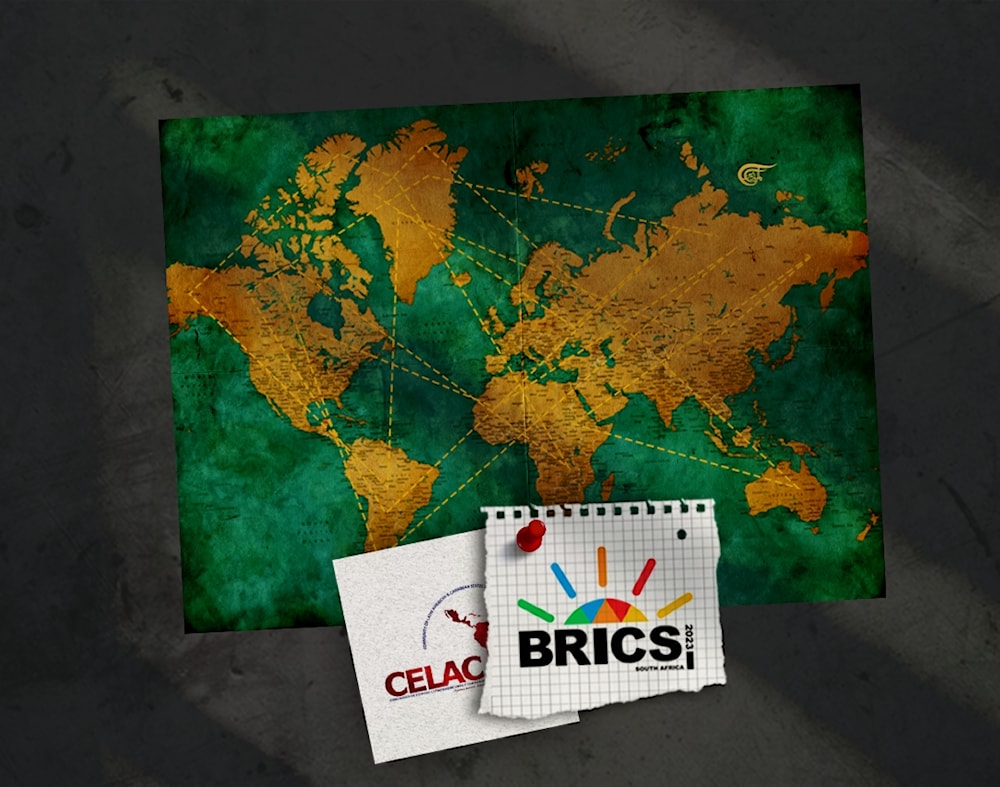Lessons in multipolarity from the regions
Multipolarity's main shape today can be seen in the creation and expansion of BRICS, yet distinct elements of the multipolar process can be seen in the regions and these may have broader lessons.
-

Counter-hegemonic regionalism, a feature of multipolarity (Illustrated by Zeinab al-Hajj; Al Mayadeen English)
Multipolarity is a term advocated in Russia during the trauma of the 1990s, then popularized by Hugo Chavez in Latin America. Its main shape today can be seen in the creation and expansion of BRICS. However, distinct elements of the multipolar process can be seen in the regions, and these may have broader lessons.
1: Counter hegemonic regionalism
Counter-hegemonic regionalism can be seen in one of the central traditions of Latin America, where a two-century process, facilitated by Hugo Chavez, led to the creation of the progressive bloc, the ALBA, and the broader blocs the CELAC and UNASUR. Both Simon Bolivar and Jose Marti had called for an American union against the threat of domination by both Spanish and North American empires.
In each case, these formations have created mechanisms for resolving regional problems without intervention from Washington or its ‘Pan American’ organs, like the Organization of American States (OAS/OEA). Importantly, the counter-hegemonic blocs also lay the foundation for strategic and economic cooperation with other regions.
Even regional blocs set up mainly for economic benefit may gain sufficient weight to resist hegemonic pressures. For example, the ASEAN bloc with 10 states and 600 million people has been able to build and maintain strategic partnerships with China and with Russia, despite Washington’s efforts to isolate and boycott those two. ASEAN is not yet a counter-hegemonic bloc, but it seems able to defend its independence.
2: Regional security coordination
Regional security coordination can be seen in military cooperation between members of the ‘Axis of Resistance’ in West Asia (Iran, Iraq, Syria, Yemen, Hezbollah), initiated by Commander Qassem Soleimani, and in West Africa’s Sahel Alliance, where three nations (Burkina Faso, Mali, and Niger) have expelled French and US occupation forces. Mali, Burkina Faso, and Niger have a mutual defense pact, which aims to help each other against possible threats of internal or external aggression. ISIS-style terrorism has affected them all, and (as in Iraq and Syria) US and French forces used that as a pretext for interference. Such security coordination may be a precursor to the formation of counter-hegemonic regional blocs to advance regional leverage.
3: Cooperation in the face of siege warfare
Financial and economic cooperation has become necessary for the many (about two dozen) independent nations subject to unilateral coercive measures (UCMs) aka “sanctions” or siege warfare, almost all of which comes from the NATO states. In 2008, President Obama began to impose huge “fines” on third-party banks doing business with its UCM targets, like Iran and Cuba. When the US economy seemed to be at the top, they spoke of “free trade”, but now that it is in decline, we see massive siege warfare. Washington has imposed unilateral “sanctions” on one-third of the countries on Earth, including 60% of poor nations. This economic warfare has killed millions of civilians across the globe. BRICS and the SCO are the major hope for the coordination of such cooperation, in particular through energy cooperation, currency swaps, and a new financial architecture.
4: The developmental logic of BRICS
Many nations that are not subject to UCMs may still see that BRICS is a viable alternative for those wanting to escape unipolarity - and the dollar dictatorship - without inviting reprisals from the hegemonic powers. Nevertheless, they want to escape the effects of a dominant dollar – i.e. artificial depreciation of local currencies, the disadvantageous distortion of trade prices, the automatic transmission of US interest rates, and disincentives for foreign investment. They also seek refuge from the impact of third-party coercive measures, such as “fines” or the freezing of payments for trading with Iran, as experienced by European banks and South Korea. No nation has the option of ‘free trade’ under this suffocating dollar dictatorship.
A clamor for refuge from this financial and commercial regime can already be seen in the recent inclusion in BRICS of several subordinate allies of the USA: Egypt, the UAE, and Saudi Arabia. Clearly, these states believe they can take advantage of the new opportunities in BRICS without breaking in all respects from their patron. This development underlines the importance of explaining the developmental logic of BRICS, including favorable access to trade and investment with other BRICS members and non-coercive forms of cooperation.
5: Strong ‘rights enabling’ independent states
There is a wider need to escape the neoliberal formula, which demands that non-hegemonic states remain weak and surrender control of their political economy to giant corporations. This formula does not recognize that only strong, independent states that facilitate citizens’ rights can establish and defend independent policy and practice. Weak independent nations are destroyed, in today’s predatory world. Of course strong, independent states are often abused as ‘dictatorships’ (for regulating foreign corporate entry and activity) by the actual dictators of the world. But suffering such abuse is far better than obliteration. Strategic independence may even require pre-emptive defense, as Russia exercised with its SMO in SE Ukraine.
6: Alliances with shared principles but diverse cultures
As the ALBA and the emerging West Asian alliance show, new regional blocs need not imply incorporation into a local hegemonic grouping. Diverse cultures, ideologies, and systems can work together for mutual benefit. In this way, secular pluralist Syria is closely allied to the Islamic Republic of Iran, while socialist-humanist Cuba remains close to Bolivia, a state based on the indigenous concepts of Vivir Bien (Living Well). Similarly, Indonesia has brought the “unity in diversity” slogan of its coat of arms (Pancasila) into ASEAN.
7: Oppose normalization with fascist regimes
Multipolarity cannot ‘normalize’ with open fascism. Russia finds it impossible to coexist with the neighboring anti-Russian, neo-Nazi Kiev regime, and that has led to demands for denazification. Similarly, the emerging Palestinian state cannot be asked to coexist with a genocidal, apartheid-Israeli regime committed to racial massacres, ethnic cleansing, and ongoing land theft. Comprador Arab elites might fall for the bribes of the mythical "two-state solution", but it is not generally viable, at best a pathway to a Bantustan-style ghetto or at worst to an ongoing war of annihilation. No nation should be asked to ‘normalize’ with such fascist regimes. A democratic Palestine requires the dismantling of apartheid "Israel", a single democratic state which addresses historic land theft and justice for the millions of displaced refugees.
I suggest these elements of the multipolar process in the regions deserve wider attention.

 Tim Anderson
Tim Anderson
 6 Min Read
6 Min Read











